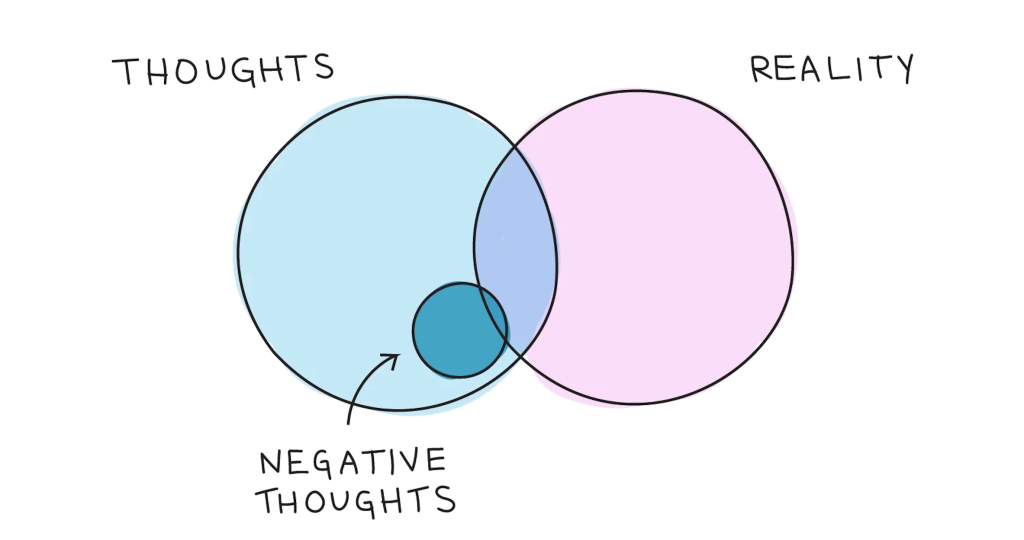Overthinking.
Generally, “overthinking” refers to the process of repetitive, unproductive thoughts about the past and present and “worry” about the future.

Overthinking is the art of creating problems that aren’t even real.
Humans are wired to worry. You are not alone in your cycle of repetitive thoughts. Our brains continually imagine futures that will meet our needs and things that could stand in our way. And many times, those needs may be in direct conflict with each other. That’s when our overthinking shifts into devilish spins to nowhere. However, our headspace can also become crystal clear, free of distraction.
We’ve all experienced moments of flow when our attention is effortlessly absorbed in our actions. We are one with our doing. Studies carried out in real-time confirm an increase in happiness when we can focus our attention on what they are doing rather than when our minds are free to wander. It may seem odd then that we leave our minds to wander for half the day, despite the potential havoc.

The reason can be found in the activity of linked brain regions, such as the default mode network, that become active when our attention is not occupied with a task. These systems function in the background of consciousness, envisaging futures compatible with our needs and desires and planning how those might be brought about.
Human brains have evolved to do this automatically; planning for scarcity and other threats is essential to ensure survival. But there’s a downside: anxiety. Thoughts with a minimal basis in reality. Studies have shown that some people prefer electric shocks to be left alone with their thoughts. Sound familiar? Why? The graphic below is our overthinking, generating a simple but very flawed perspective.

Overthinking is a maladaptive or dysfunctional strategy for dealing with anxiety. We overanalyze an issue to the point where it’s unhelpful and may even be harmful, says Shelly Smith-Acuña, Ph.D., professor at the University of Denver. It’s tempting because it feels like we’re doing something, but we risk getting stuck in a loop of negative thoughts and anxiety.
Overthinking can have another negative impact on our lives. At the University of Chicago, Professor Sian Beilock studies athletes who “choke” in big games, even after practicing for years. How can we choke on something we have worked to perfect for years?
We cannot think through a routine or a practiced action, like making a 3-foot golf putt. Compare it to quickly shuffling down a flight of stairs. We could do that without thought. But if we’re asked to do it, and at the same time think about how much we bend our knee each time or what part of our foot is touching the stair, we would probably fall on our face. That’s what happens when we choke. We try to think our way through the action.
Our Evolution
The non-stop planning for our future is part of our evolutionary history. Its value is evident in the effortless persistence and universality with which it occurs. Mind-body programs like yoga and mindfulness aid us in dealing with the yearning to be happier in the present moment, ignoring the pull of control of the future moments of our lives.
How we harness our attention is central to our emotional well-being. Mindfulness training, for example, asks us to direct our attention to the sensations of breathing. And while that may seem easy, the mind resists tenaciously. Despite our resolve, seconds later, our attention has naturally defaulted to planning daydreams.
The recognition of this automatic evolutionary process is progress toward a solution.
In those moments when we do manage to notice these thoughts with some detachment, we see the evolutionary purpose. Our mind’s (“What could go wrong here?”) perspective is a survival instinct run amok.
Additionally, we begin to notice that this hoping, comparing, and regretting is often concerned with family and friends, jobs, and money. The themes of relationship, status, and power were central to the survival of tribal primates. I am sure you have heard the phrase “monkey mind.”
The point of my post is this, overthinking kills our awareness. Locked in a ruminating loop in our head, we’re not paying attention to life’s more pressing signals. My solution is straightforward. Climb into our three-foot world of items and inputs only we control.

The graphic above is adapted from my forthcoming book, “Thinking 4 Tomorrow”. During times of stress, pressure or worry, focus on what we can control at the moment and ignore everything else. Staying in your three-foot world is a helpful worldview (perspective) in any negative situation you encounter. Rumination ends as we immerse in our task at hand. Our three-foot world brings our focus in tight to things you can “truly” control, overlapping with something that matters.
Until next time. Travel safe.

